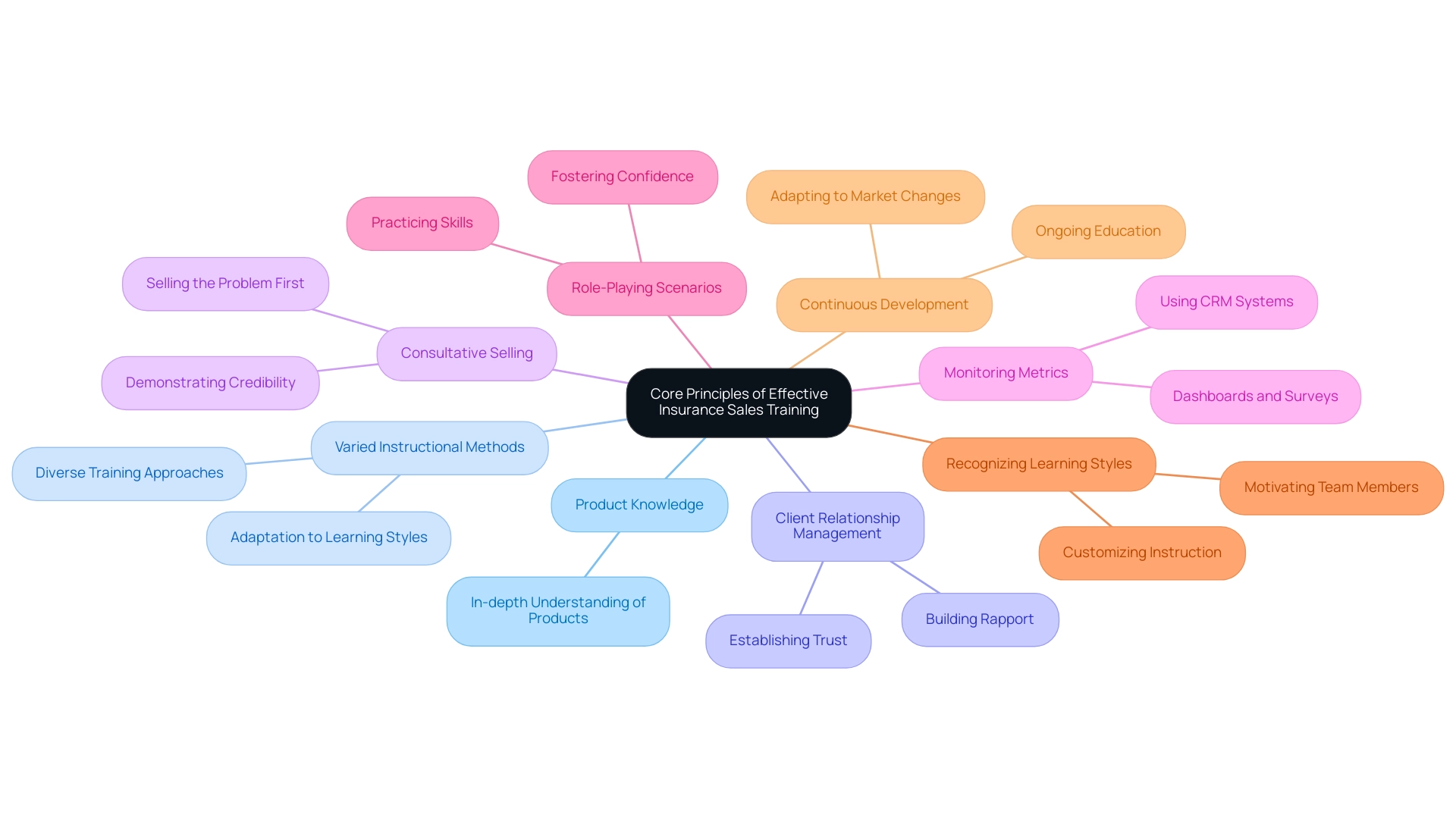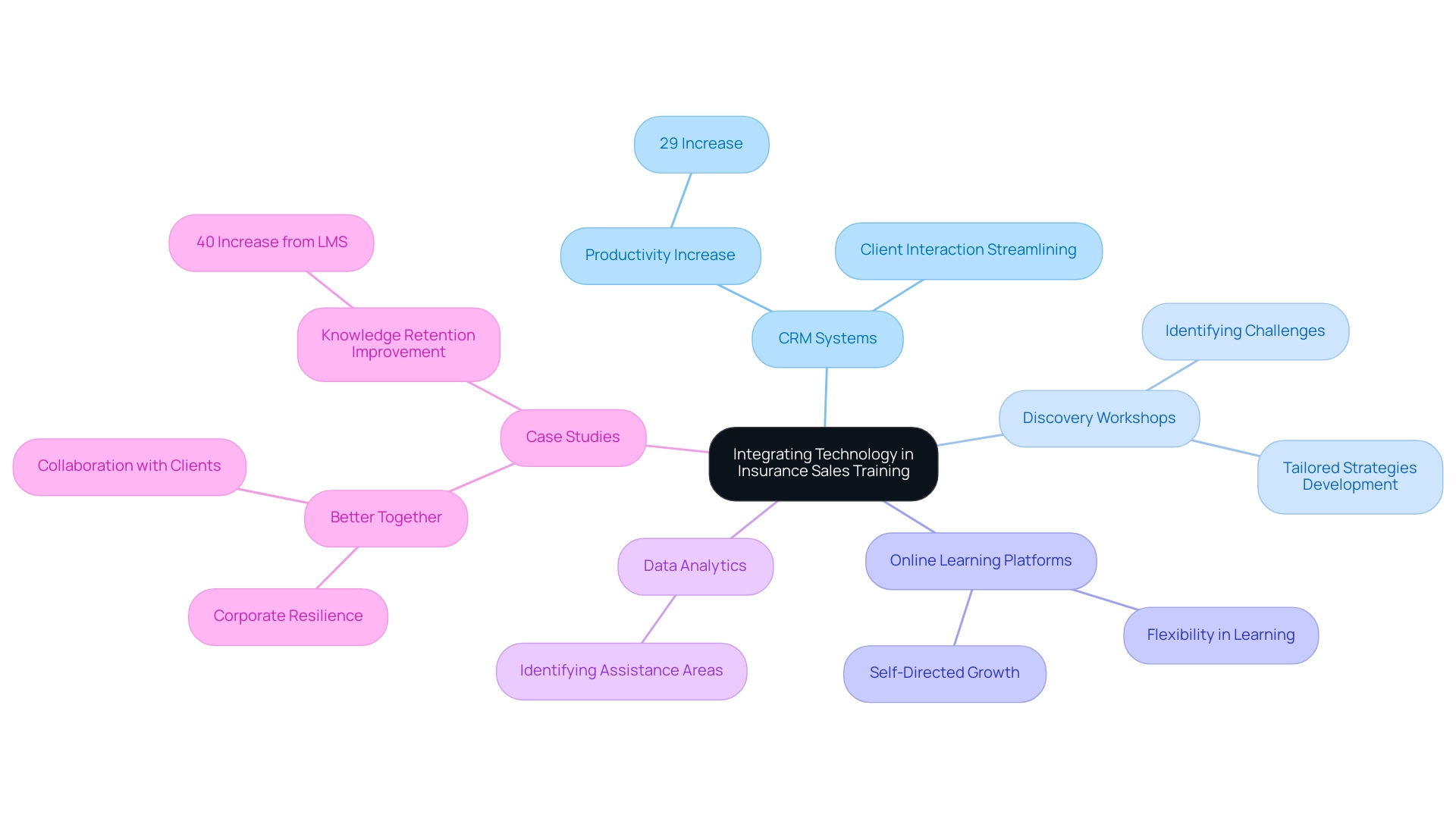
Sales training for insurance is most effective when it incorporates diverse instructional methods, emphasizes product knowledge, and focuses on building client relationships. The article supports this by detailing strategies such as customized training solutions, technology integration, and ongoing education that collectively enhance agent performance and adaptability to market demands.
In the competitive landscape of insurance sales, effective training is not merely advantageous; it is essential for success. Organizations must embrace a multifaceted approach to training that encompasses:
By focusing on core principles such as:
Companies can foster an environment where agents excel in meeting client needs and adapting to market changes. Furthermore, the customization of training solutions tailored to specific agency environments enhances engagement and retention, ultimately driving sales performance.
This article delves into the critical elements of effective insurance sales training, exploring how the right strategies can empower agents, improve client interactions, and ensure sustained growth in an ever-evolving industry.
Effective sales training for insurance is grounded in several fundamental principles that together improve representative performance. Foremost among these is a robust foundation in product knowledge; agents must possess an in-depth understanding of the insurance products they offer to effectively meet client needs. As highlighted by Benjamin Thornton, Farmers Insurance Agency Owner, 'You can instruct, coach, encourage, mentor, and instruct again but if you restrict your sales development to just one style, you will also restrict your results.'
This emphasizes the necessity of varying methods of instruction. Additionally, successful development programs emphasize client relationship management through sales training for insurance, providing representatives with the skills to establish trust and rapport with clients. A critical aspect of consultative selling is to sell the problem first and then the solution, establishing credibility and demonstrating effective decision-making and risk mitigation capabilities.
To assess the effectiveness of these development programs, organizations should monitor metrics over time through CRM systems, dashboards, or surveys, quantifying the programs' return on investment. Integrating role-playing scenarios into sales training for insurance allows agents to practice and refine their skills within a controlled environment, fostering confidence and competence. Insights from Pods Asia's proven revenue transformation strategies, drawn from over 20 years of experience and 500+ successful projects, illustrate the importance of establishing credibility and effectively addressing objections in consultative selling.
Additionally, the case study titled 'Understanding Team Learning Styles' stresses the importance of recognizing different learning styles within a team. Customizing instruction to accommodate these various styles can significantly enhance effectiveness and overall sales performance when implementing sales training for insurance. Unique and non-standard solutions highlighted in the case studies further illustrate successful implementations of development programs.
Equally important is the acknowledgment that education should be an ongoing process rather than a singular event. Continuous development, including sales training for insurance, enables agents to adapt to market changes and evolving client expectations. Research has demonstrated that organizations investing in extensive development programs experience a significant 50% boost in revenue performance compared to those that do not prioritize such initiatives.
Moreover, when proof of effectiveness is required, it is essential to provide solid evidence rather than vague assertions, ensuring that the program's impact is clearly communicated.

Tailored development solutions, including sales training for insurance, are crucial for organizations seeking to close the varied skills and knowledge gaps found within their sales teams. By crafting programs tailored to the specific environment of an agency, companies can significantly enhance both engagement and effectiveness. For example, a development program that includes real-life case studies pertinent to the local market often resonates more profoundly with representatives than generic content.
Furthermore, with 88% of insurance customers demanding more personalized insurance products, sales training for insurance is crucial for representatives to be equipped with the skills to meet these expectations. The incorporation of technology, such as Learning Management Systems (LMS), enables organizations to track progress and modify educational modules based on employee performance, ensuring that staff remain informed about industry trends. This method has demonstrated exceptional outcomes; organizations that implement customized educational solutions report a 30% rise in employee retention rates, highlighting the significant benefit of investing in workforce development.
A compelling illustration of this is observed in the application of microlearning in the field of coverage education, where content is divided into concise modules, enabling learners to access easily understandable information at any time, thereby enhancing knowledge retention. As mentioned by Nidhi Agarwal, a content writer/editor at LeadSquared, 'Therefore, you can develop internal certification courses that will continue enhancing your representatives' selling abilities.' This highlights the importance of tailored education, such as sales training for insurance, in improving performance and employee satisfaction within the financial services sector.
Furthermore, testimonials from clients who have adopted these development solutions emphasize their efficiency, with many indicating enhanced revenue results and boosted employee confidence in their positions.
The incorporation of technology in sales training for insurance fundamentally improves the learning experience for representatives. Customer Relationship Management (CRM) systems play a pivotal role in streamlining client interactions, with studies indicating that organizations utilizing CRM systems experience a 29% increase in productivity. This allows representatives to manage relationships more effectively and efficiently.
Moreover, discovery workshops are crucial for identifying 'kriptonites' within sales groups, as they promote open discussions that reveal specific challenges and barriers encountered by representatives. These insights enable the development of tailored strategies that unlock sales potential and enhance performance. Online learning platforms provide the flexibility that enables individuals to study at their own pace, encouraging a self-directed approach to professional growth.
The use of data analytics further enhances the development process by identifying specific areas where individuals may need extra assistance or instruction. A relevant example of this effectiveness can be observed in a firm that implemented a Learning Management System (LMS) for instructional delivery, resulting in a remarkable 40% increase in knowledge retention among agents. Furthermore, the case study named 'Better Together' demonstrates how Liberty Mutual's dedication to Corporate Resilience improves educational outcomes through collaboration with clients, highlighting the significance of shared strategies in attaining success.
By utilizing such technological innovations and enhancing revenue strategies through customized account segmentation tactics—where accounts are divided based on the suitable revenue approach rather than conventional metrics—organizations can double their productivity and adjust to the changing needs of the sector. As Kim et al. (2021) emphasize, ethical data practices are essential in maintaining customer trust and ensuring compliance, reinforcing the significance of technology in development initiatives within the sector.
The continuous focus on technology incorporation within sales training for insurance highlights its importance in establishing a responsive and effective learning atmosphere for professionals in the field.

To effectively assess the impact of training in the sector, organizations must establish clear metrics that encompass performance, client retention rates, and agent satisfaction. Leveraging innovative sales solutions such as Magical Selling's Tailored Transformation-as-a-Service and Pods Asia's MAGIC Sales Academy can enhance these efforts. Utilizing an insurance dashboard can streamline reporting processes, allowing agencies to identify inefficiencies and improve financial performance.
A systematic approach, including pre- and post-training assessments, is vital in quantifying knowledge gains and pinpointing areas for improvement. Furthermore, collecting participant feedback is crucial, as it highlights both the strengths and weaknesses of the program. For instance, one organization that implemented a structured evaluation process observed a remarkable 20% increase in revenue results over a six-month span, highlighting the critical role that methodical assessments play in enhancing training effectiveness.
This case highlights the significance of monitoring revenue and marketing metrics as vital for agency growth. As noted by Johnson Manaloor, Senior Partner at Tata AIA Life, 'Data and reports involve analyzing the quantitative and qualitative information from your selling activities and results.' By utilizing such insights and consistently assessing programs based on outcomes and feedback, agencies can better align their initiatives with overall business strategies, ensuring sustained growth and development.
Our pricing for the comprehensive sales training for insurance program is $150 per month, which includes access to deep dive audio podcast sessions, the ability to request tailored topics, three consultation sessions per month, comprehensive sales skill/will tracking, ongoing sales strategy refinement, and priority email and phone support. Additionally, visitor comments may be checked through an automated spam detection service, ensuring the quality and security of your data handling.
In the realm of insurance sales, effective training emerges as a cornerstone of success. A thorough understanding of products, adept client relationship management, and the seamless integration of technology are crucial components that empower agents to thrive. By implementing varied training methods and fostering continuous development, organizations can create an environment where agents not only meet client needs but also adapt to the dynamic market landscape.
Customized training solutions play a pivotal role in enhancing engagement and effectiveness among sales teams. Tailoring programs to reflect the unique challenges and expectations of specific agencies ensures that agents are well-equipped to navigate the demands of an increasingly personalized insurance market. The incorporation of technology, such as Learning Management Systems and CRM tools, further elevates training outcomes by providing flexibility and data-driven insights that enhance agent performance.
Ultimately, measuring the effectiveness of training through clear metrics and systematic evaluations is essential for continuous improvement. By tracking sales performance, client retention rates, and agent satisfaction, organizations can refine their training initiatives to align with business goals. The evidence is clear: investing in comprehensive and tailored training solutions not only boosts sales performance but also fosters a culture of growth and excellence within insurance agencies. As the industry continues to evolve, prioritizing effective training will remain a critical factor in achieving sustained success.
What is the foundation of effective sales training for insurance?
Effective sales training for insurance is grounded in a robust foundation of product knowledge, ensuring that agents have an in-depth understanding of the insurance products they offer to meet client needs effectively.
Why is it important to vary instructional methods in sales training?
Varying instructional methods is crucial because it prevents the restriction of sales development to just one style, which can limit results. Different approaches can enhance learning and performance.
How does client relationship management play a role in sales training?
Client relationship management is emphasized in successful sales training programs, equipping representatives with the skills to establish trust and rapport with clients, which is essential for consultative selling.
What is the concept of consultative selling in insurance?
Consultative selling involves selling the problem first and then the solution, which helps establish credibility and demonstrates effective decision-making and risk mitigation capabilities.
How can organizations assess the effectiveness of their sales training programs?
Organizations can assess the effectiveness of their sales training programs by monitoring metrics over time using CRM systems, dashboards, or surveys to quantify the programs' return on investment.
What role does role-playing play in sales training for insurance?
Role-playing scenarios are integrated into sales training to allow agents to practice and refine their skills in a controlled environment, fostering confidence and competence.
Why is it important to recognize different learning styles during training?
Recognizing different learning styles within a team is important because customizing instruction to accommodate these styles can significantly enhance the effectiveness of the training and overall sales performance.
What is the significance of continuous education in sales training?
Continuous education is vital as it allows agents to adapt to market changes and evolving client expectations, ensuring they remain effective in their roles.
What impact can extensive development programs have on revenue performance?
Research shows that organizations investing in extensive development programs can experience a significant 50% boost in revenue performance compared to those that do not prioritize such initiatives.
How should the effectiveness of a sales training program be communicated?
The effectiveness of a sales training program should be communicated with solid evidence rather than vague assertions, ensuring that the program's impact is clearly demonstrated.